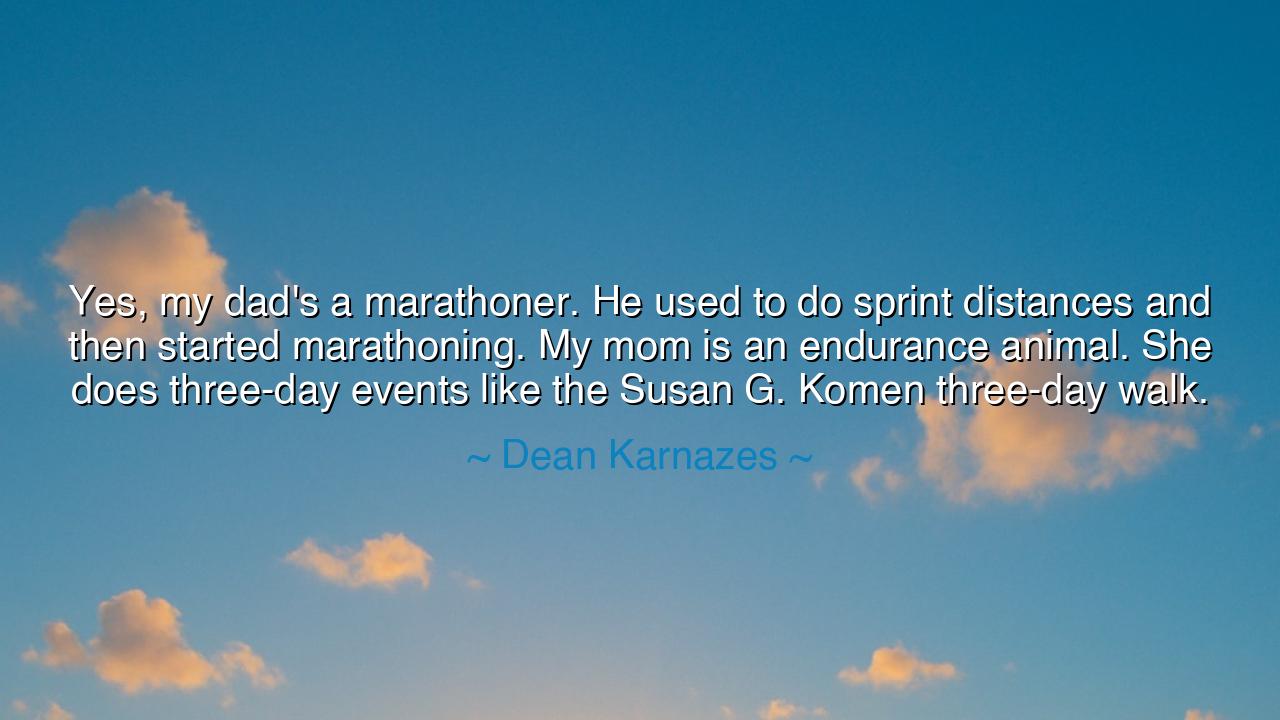
Yes, my dad's a marathoner. He used to do sprint distances and
Yes, my dad's a marathoner. He used to do sprint distances and then started marathoning. My mom is an endurance animal. She does three-day events like the Susan G. Komen three-day walk.






In the words of Dean Karnazes, “Yes, my dad’s a marathoner. He used to do sprint distances and then started marathoning. My mom is an endurance animal. She does three-day events like the Susan G. Komen three-day walk.” These words, spoken with humility and admiration, carry more than the story of athletic heritage — they reveal a deeper truth about endurance, legacy, and the spirit that binds generations. Karnazes, known as one of the world’s greatest ultramarathoners, here honors the roots of his own unyielding will. For in his parents’ footsteps lies the origin of his strength — not merely of the body, but of the soul that refuses to quit.
Dean Karnazes was born to a family shaped by motion — a household that revered the discipline of effort and the quiet glory of perseverance. His father, once a sprinter who turned to the vast, unending horizon of the marathon, embodies the journey of transformation — from speed to stamina, from quick victory to long devotion. His mother, whose endurance carries her through days of charitable walking for the sake of others, mirrors the same unwavering heart in a different form. Together, they stand as twin pillars of his upbringing: one teaching the power of pushing beyond limits, the other teaching the sacredness of purpose in endurance.
In the ancient days, the Greeks, among whom Karnazes’ own ancestry runs deep, worshipped the virtue of arete — excellence achieved through toil and perseverance. They believed that the human spirit revealed its divinity not in ease, but in endurance. The story of Pheidippides, the soldier who ran from Marathon to Athens to bring word of victory, stands eternal in this lineage. He ran not for glory, but for duty; not for applause, but for his people. When Karnazes speaks of his parents as marathoners and endurance athletes, he invokes that same sacred tradition — that greatness is not measured by speed or momentary triumph, but by the will to continue when all strength is spent.
There is also, within his words, a reverence for family as the forge of resilience. No champion is born in isolation; the flame that drives them is often lit by those who came before. His father’s transition from sprint to marathon mirrors life’s own journey — the realization that the longest races are not won by bursts of strength, but by constancy. His mother’s three-day walks are acts of compassion wrapped in endurance, showing that perseverance is not only a warrior’s virtue, but also a healer’s. From them, Karnazes inherited not merely the capacity to endure, but the reason to endure — the understanding that endurance without purpose is motion without meaning.
Consider, too, the lesson of Emil Zátopek, the legendary Czech runner who trained himself by running in army boots and carrying his wife on his back. His greatness came not from natural ability, but from an indomitable heart. When asked why he pushed so hard, he said, “If one can’t be a poet, be the poem.” In the same spirit, Karnazes’ reflection on his parents is a reminder that greatness is inherited not through blood, but through example. His parents wrote the poem of endurance with their own lives, and he became the verse that carried it forward.
The lesson within this quote, then, is that endurance is not a gift of nature, but a legacy of nurture. It is built in the home, shaped by love, and refined by struggle. To endure is to carry forward the courage of those who raised you — to transform their example into action. Whether you run across deserts or simply through the trials of daily life, the spirit of endurance lies in remembering who taught you to take your first steps, and why.
So, children of effort and dreamers of the horizon, take heed: strength is not found in the perfection of the body, but in the continuity of spirit. Look to those who came before — your parents, your teachers, your ancestors — for their resilience flows through you like a hidden river. When the road grows long and your heart begins to doubt, remember that you were born from endurance itself. Run not for the finish line, but for the honor of those who taught you to begin.
Thus spoke Dean Karnazes, the modern messenger of ancient truth: that endurance is both inheritance and offering, both legacy and act of love. The race of life is not to the swift, but to the steadfast — and those who endure with purpose shall find that the journey itself is victory.






AAdministratorAdministrator
Welcome, honored guests. Please leave a comment, we will respond soon